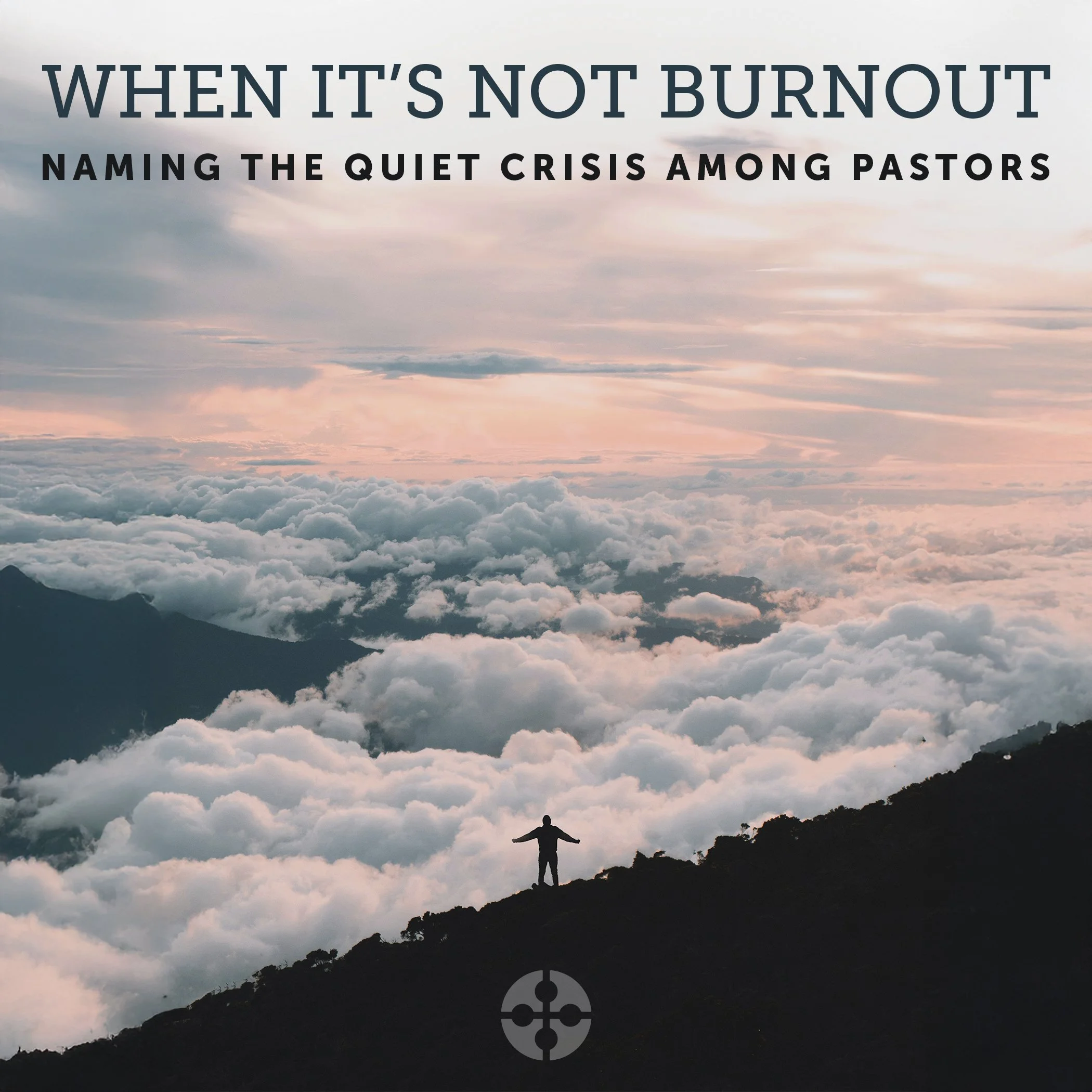When It’s Not Burnout: Naming the Quiet Crisis Among Pastors
I recently came across a distinction I can’t shake:
burnout and demoralization are not the same thing.
We talk often about pastoral burnout—and we should. The exhaustion, the constant availability, the emotional weight of walking with people through their hardest moments. Burnout is real and it takes a toll.
But demoralization is something different. And for many pastors today, it’s the deeper pain beneath the surface.
Burnout says, “I can’t keep going like this.”
Demoralization says, “This isn’t the ministry I signed up for anymore.”
That second sentence is harder to admit. But many pastors are living it.
Burnout vs. Demoralization: Why the Difference Matters
Burnout is about depletion. It’s what happens when the tank is empty and the pace is unsustainable. It calls for rest, boundaries, restoration of the soul, and a more humane workload.
Demoralization, though, is about disconnection from calling. It appears when the ministry you felt called to has been replaced by something you never intended to carry.
Pastors describe it this way:
“I became a pastor to shepherd people, not run an institution.”
“I’m doing work I don’t believe in, but I don’t feel permission to say it out loud.”
“What I feel called to has been replaced by expectations that drain my spirit.”
“I’m constantly managing conflict instead of nurturing disciples.”
This is not fatigue. It’s vocational grief. And it requires a different kind of response.
Why Naming It Brings Clarity
Pastors often try to treat demoralization with the same remedies as burnout—a vacation, a weekend away, a short sabbatical. Helpful, yes. Transformative, no. Because the core issue isn’t energy. It’s loss—loss of purpose, authenticity, agency, and joy.
Naming this doesn’t create a crisis; it reveals one that is already there. And truth-telling opens the door to discernment.
Holding the Tension: Emotional Clarity Without Impulsive Decisions
Our culture places a high value on emotional awareness, which is good. But sometimes we struggle to separate what we feel from what is wise. Many pastors have a moment of honest awakening—“This is not what I signed up for”—and that realization is important. It often signals deep misalignment in the soul. But recognizing misalignment doesn’t automatically mean you should punch the eject button immediately.
Many pastors feel so discouraged or disoriented that the only option they can imagine is escape. And in that urgency, some make sudden exits that unintentionally place their families under enormous financial strain, with no clear pathway for provision. It’s heartbreaking to watch how often spouses bear the emotional and economic weight of abrupt, reactive decisions. Leaving an unhealthy environment may well be the right choice—but discernment matters.
So how do you approach this responsibly?
You start by identifying what the emotions are saying, and then you slow down enough to prayerfully consider the next step. This is where wise counsel becomes essential. A spiritual director, mentor, or trusted guide can help you notice what’s beneath the surface and discern what God might be inviting you to do—not reactively, but faithfully.
There is no formula. Every situation is unique. But none of us are meant to navigate these crosscurrents alone.
The goal isn’t to silence your emotions or blindly obey them. It’s to bring them into conversation with wisdom, responsibility, and God’s gentle leading.
One Practical Step: Creating Space for Discernment
When pastors feel overwhelmed, they often reach for quick fixes: a pep talk, a leadership book, a coaching session, a fresh set of goals. Those can be helpful, but they rarely touch the deeper vocational questions beneath demoralization.
A spiritual director offers something very different.
It’s not coaching.
It’s not advice.
It’s not performance-driven.
It’s sacred space—slow, unhurried, honest—where you can:
name what hurts
listen for what God is stirring
discern whether the dissonance is internal, external, or both
imagine a path forward that honors your calling and your responsibilities
Spiritual direction doesn’t give you more tasks. It gives you permission to listen, to be still, and to consider what God is wanting to do through this situation and in you.
It’s one of the few places where you can say the quiet part out loud without fear of disappointing anyone.
A Path Toward Hope
If what you’re experiencing is burnout, seek rest. If what you’re experiencing is demoralization, seek clarity and reconnection with your calling.
And if you’re unsure which one you’re facing, that uncertainty is itself an invitation.
Sometimes the most healing question you can ask is:
“What part of me is tired, and what part of me is grieving?”
You don’t have to discern that alone. Find wise companions who can help you listen for God’s voice—slowly, honestly, without rushing. And if you don’t have anyone, I would love to connect with you to hear more (grab a time here).
Sometimes the first step back toward hope is simply making space to hear your own soul again.

